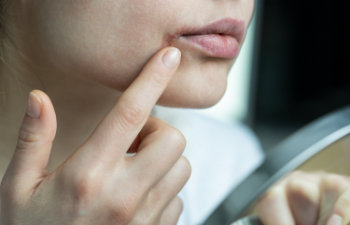
Cold sores are highly contagious, painful open blisters that appear in or around the mouth, typically on the lips. It spreads through saliva or close contact, most commonly through kissing or the sharing of straws, utensils, towels or lip balm with a person who has a cold sore.
Once you have experienced a cold sore, you will likely get more throughout your lifetime. That is because the herpes simplex virus (HSV-1) causes cold sores. After an HSV infection, the virus moves to neighboring nerve cells, where it might remain dormant for a long time. Then, when the virus is triggered, it can begin reproducing again, resulting in another cold sore.
Cold Sore Triggers
Cold sore triggers differ from person to person. One person’s trigger for developing cold sores might not apply to another. Knowing your most likely cold sore triggers will help you avoid them or, at the very least, manage symptoms more promptly and effectively when they arise.
The following are the most common triggers of cold sores on lips:
Stress
Overwhelming stress can impact your physical health, including triggering cold sores. In addition, our immune systems are weakened by mental stress. This allows the dormant cold sore virus to reproduce and develop blisters.
Fatigue
You may be more prone to developing cold sores if you are exhausted and rundown. Your immune system is taxed by lower energy reserves, making it more difficult for your body to fight against infections like HSV-1. Getting enough rest is essential to assist your body in battling the virus and preventing blister formation.
Sun Exposure and Cold Weather
Cold sores can be triggered by too much sun exposure and cold temperatures. Temperature changes and air moisture could significantly hinder your body’s ability to prevent the virus from developing blisters. In addition, dry air, freezing temperatures and wind can cause your lips to dry up, increasing their susceptibility to blistering.
Hormonal Changes
Hormonal fluctuations can trigger cold sores during a regular menstrual cycle. As a result, cold sores are commonly experienced before or during your period. Some women also get breakouts while they are pregnant.
Weakened Immune System
The cold sore virus is dormant in the nerve cells in your mouth. However, while your immune system typically prevents the virus from multiplying and developing blisters, if it is occupied with battling another infection or virus, like the flu or a cold, you might experience a cold sore outbreak.
Certain Foods
Consuming arginine-rich foods – such as beans, meat, chocolate and dairy – can trigger or worsen a cold sore. This is because arginine is required for the virus to replicate. Acidic foods and beverages can also trigger a cold sore outbreak. This includes citrus fruits, tomatoes, orange juice and even soda.
Cold Sore Treatment in Atlanta
To learn more about what triggers cold sore outbreaks, contact us at Medical Dermatology Specialists today to schedule a consultation. Our herpes treatment experts in Atlanta can accurately diagnose your condition and provide you with effective herpes treatment solutions.
Posted on behalf of
5730 Glenridge Drive, Suite T-100
Atlanta, GA 30328
Phone: Call (404) 939-9220
FAX: (470) 312-2157
Email: jstalls@atlmedderm.com


